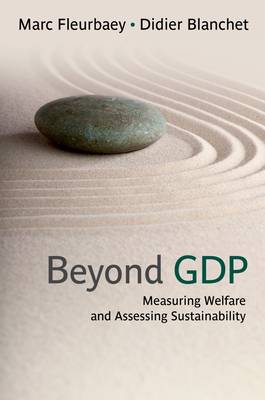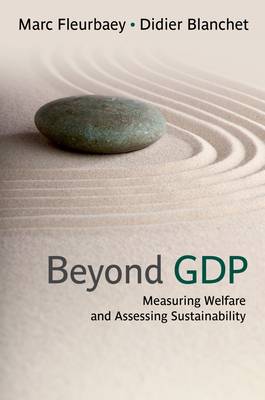
- Retrait gratuit dans votre magasin Club
- 7.000.000 titres dans notre catalogue
- Payer en toute sécurité
- Toujours un magasin près de chez vous
- Retrait gratuit dans votre magasin Club
- 7.000.0000 titres dans notre catalogue
- Payer en toute sécurité
- Toujours un magasin près de chez vous
Beyond GDP
Measuring Welfare and Assessing Sustainability
Marc Fleurbaey, Didier BlanchetDescription
In spite of recurrent criticism and an impressive production of alternative indicators by scholars and NGOs, GDP remains the central indicator of countries' success. This book revisits the foundations of indicators of social welfare, and critically examines the four main alternatives to GDP that have been proposed: composite indicators, subjective well-being indexes, capabilities (the underlying philosophy of the Human Development Index), and equivalent incomes.
Its provocative thesis is that the problem with GDP is not that it uses a monetary metric but that it focuses on a narrow set of aspects of individual lives. It is actually possible to build an alternative, more comprehensive, monetary indicator that takes income as its first benchmark and adds or subtracts corrections that represent the benefit or cost of non-market aspects of individual lives. Such a measure can respect the values and preferences of the people and give as much weight as they do to the non-market dimensions.
A further provocative idea is that, in contrast, most of the currently available alternative indicators, including subjective well-being indexes, are not as respectful of people's values because, like GDP, they are too narrow and give specific weights to the various dimensions of life in a more uniform way, without taking account of the diversity of views on life in the population. The popular attraction that such alternative indicators derive from being non-monetary is therefore based on equivocation.
Moreover, it is argued in this book that "greening" GDP and relative indicators is not the proper way to incorporate sustainability concerns. Sustainability involves predicting possible future paths, therefore different indicators than those assessing the current situation. While various indicators have been popular (adjusted net savings, ecological footprint), none of them involves the necessary forecasting effort that a proper evaluation of possible futures requires.
Spécifications
Parties prenantes
- Auteur(s) :
- Editeur:
Contenu
- Nombre de pages :
- 336
- Langue:
- Anglais
Caractéristiques
- EAN:
- 9780199767199
- Date de parution :
- 09-05-13
- Format:
- Livre relié
- Format numérique:
- Genaaid
- Dimensions :
- 155 mm x 236 mm
- Poids :
- 598 g

Les avis
Nous publions uniquement les avis qui respectent les conditions requises. Consultez nos conditions pour les avis.






